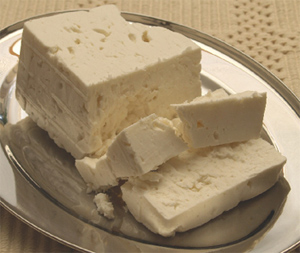May 19, 2008
Feta Cheese Combats Food Pathogens—Naturally

By Michael D. Shaw
While the benefits of the Mediterranean diet are well-known, and many of us enjoy a Greek salad, researchers have now discovered that feta cheese—made from raw milk—can actually prevent food poisoning. This finding was presented at the Society for General Microbiology’s 162nd meeting, held last month in Edinburgh.
Listen to Panagiotis Chanos, from the UK’s University of Lincoln, a researcher involved in the project:
“We were able to isolate lactic acid bacteria found in raw sheep milk from small farms in Macedonia, northern Greece. Several of these friendly bacteria naturally produce antibiotics that killed off dangerous food-poisoning bacteria like Listeria. Interestingly, we identified these friendly bacteria as enterococci, more commonly recognized as virulent and/or antibiotic resistant bacteria in hospitals. We found some strains could produce up to three different natural substances to fight different food pathogens.”
If you’re familiar with foodborne diseases, the mention of Listeria should have caught your attention, as it is one of the most feared and dangerous of the food-poisoning bacteria. A peculiar property of Listeria that affects its food-borne transmission is the ability to multiply at low temperatures. The bacteria may therefore grow and accumulate in contaminated food stored in the refrigerator. As such, listeriosis is often associated with ingestion of milk, meat, or vegetable products that have been held at refrigeration temperatures for a long period of time.
The species most identified with disease is Listeria monocytogenes, and although the bacterium was first described in 1926, it would not be until 1981 that this bug was discovered as a cause of foodborne illness. It would take an outbreak of listeriosis in Halifax, Nova Scotia.
There, 41 cases of the infection resulted in 18 deaths—confined mostly to pregnant women and newborns. The tragedy was epidemiologically linked to the consumption of coleslaw, containing cabbage that had been exposed to manure contaminated with the bacterium.
Listeriosis has many manifestations, including septicemia, meningitis, encephalitis, corneal ulcer, pneumonia, and intrauterine or cervical infections in pregnant women, which may result in spontaneous abortion or stillbirth. The typical food-poisoning gastrointestinal symptoms usually precede the more serious ones, and may be the only symptoms expressed. As you might expect, immunocompromised individuals are most at risk, and this does include pregnant women.
In fact, of the 2500 or so people who become seriously ill with listeriosis each year, 27 percent are pregnant women. And, CDC figures indicate that pregnant women are 20 times more likely to become infected than non-pregnant healthy adults.
The naturally produced antibiotics Chanos speaks of are called bacteriocins. But, compared to man-made antibiotics, bacteriocins tend to be quite specialized, having a narrow spectrum of activity, perhaps inhibiting one or two other organisms. Bacteriocins were first posited when people in the dairy processing industry noticed that certain bacteria used in making sour cream could retard spoilage of other foods.
The new research indicates that the bacteria producing these compounds are able to grow in extreme conditions such as low temperatures, and in the salty environment of cheeses. The hope is that the bacteriocins could be a natural substitute for the additives and synthetic preservatives now being put into foods. It is very likely that the bacteriocins would be much more effective, as well as safer.
A perfect partnership of modern science and nature.

